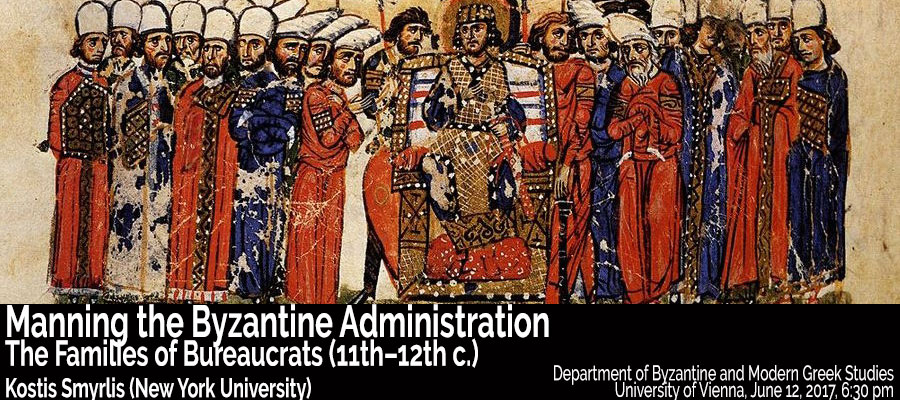Manning the Byzantine Administration: The Families of Bureaucrats (11th–12th c.), lecture by Kostis Smyrlis (New York University), Department of Byzantine and Modern Greek Studies, University of Vienna, June 12, 2017, 6:30 pm
The issue of the staffing of the administration holds the answers to some of the most important questions students of the society, the economy, and the political system have to deal with. Investigating the desireability of fiscal office, the process of selection of officials, and the socio-economic significance of office for the incumbents in an empire where private wealth mostly came from the management and allocation of fiscal resources may unlock issues like social mobility or immobility, the economic attitudes of the wealthy, and the ways state appointment was used by the emperor in his dealings with the elite.
This paper investigates the selection of fiscal officials focusing on the role of kinship, one of the three determinants of the selection, along with individual talent and official or unofficial payments. The study of officials with known careers and the evidence provided by the administrators’ surnames highlight the importance of family for the selection and advancement of individuals.
Kostis Smyrlis is Associate Professor of History at New York University. He was educated in Athens, Birmingham and Paris. He taught in Istanbul before coming to NYU in 2006. He is currently working on a book project dealing with the Political Economy of the Byzantine Empire, 1081-1345. The book proposes a new interpretation of the evolution of state finances suggesting that Byzantium’s pervasive fiscal apparatus, a powerful imperial ideology and the high aristocracy’s alliance allowed the emperor to maintain a strong grip over the empire’s territory throughout the middle ages. Having published a book on great monastic landowners in Byzantium, Smyrlis pursues his interest in the evolution of the Byzantine economy, settlement and social relations in the countryside. Another major area of his research concerns the edition in the series Archives de l’Athos of the medieval documents of Mount Athos monasteries. He is co-editor of two volumes (Actes de Vatopédi II-III) and currently heads the work on a third volume (Actes de Zographou).
